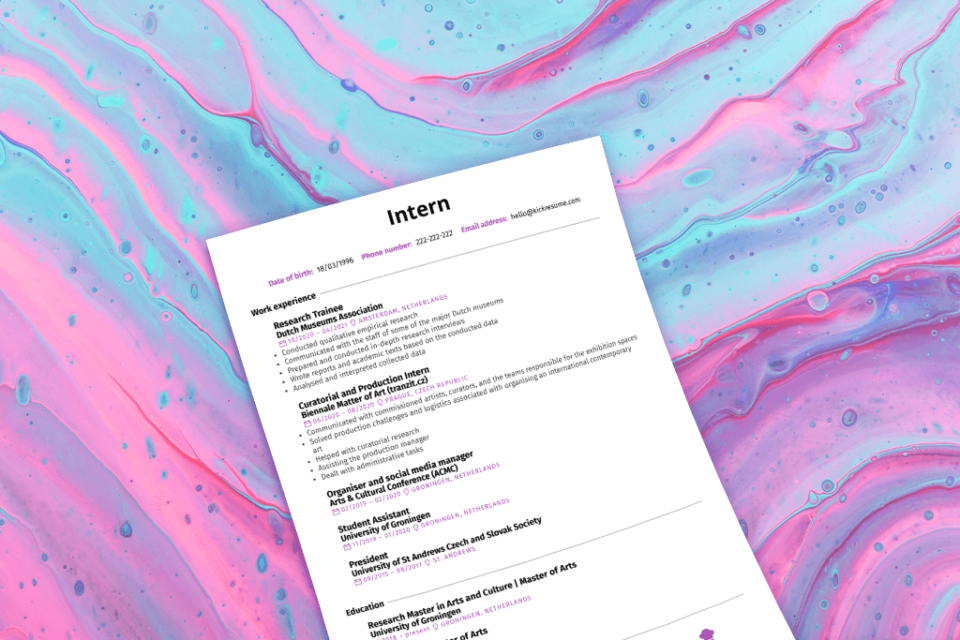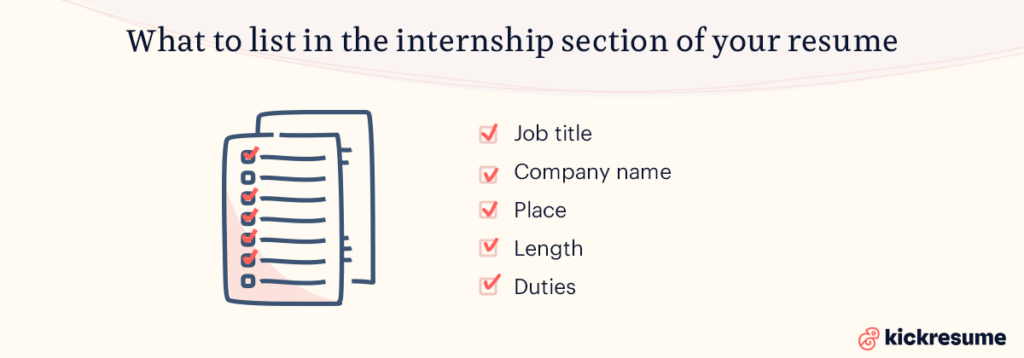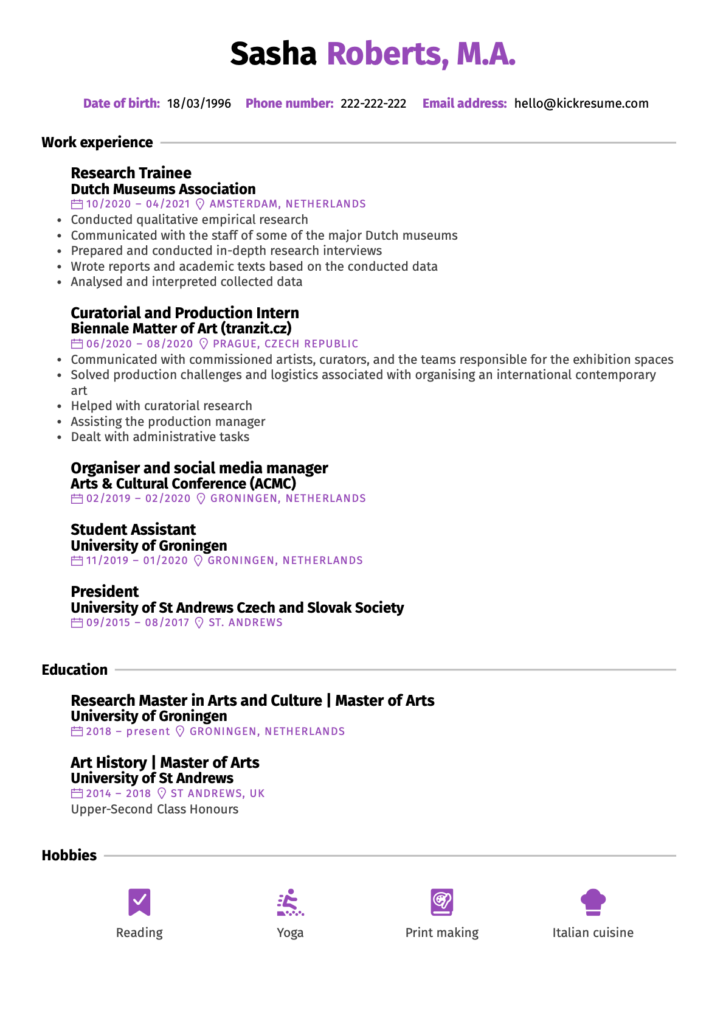
How to put an internship on your student resume [+examples] was originally published on College Recruiter.
By Kaja Jurčišinová, a resident writer at Kickresume
As a soon-to-be fresh graduate, I’m familiar with the struggle of starting a career in the challenging year of 2021 almost too well. When applying for my first serious job, all those internships that I did during my university studies were a godsend!
But are these experiences always relevant? And if they are — where and how should I present them on my resume?
If you find yourself in the same situation as I, keep on reading and let’s find out together!
In this article, you’ll learn:
- What is and isn’t an internship;
- Whether you should include it on your resume;
- When and where to put an internship on your resume;
- How to best describe your internship experience.
What can be listed as an internship experience?
Since you’re here, I’m assuming you already have internship experience. Therefore you already know what an internship is. However, putting internships on a resume comes with a set of nuances.
In other words, there are various types of short-term entry-level work experience and not all of them should be labeled as an internship.
Apprenticeship
These can be part of your vocational training. Apprenticeships offer a practical, hands-on experience with a clear timeline and list of responsibilities. They tend to last longer than an internship and are usually paid.
Most importantly, an apprenticeship leads to a specific official qualification once it’s completed.
Here’s an example:

Traineeship
This is another type of temporary work experience conducted during, or shortly after studies. It can be seen as a “work practice”.
Here, an employer has a specific program that is meant to teach a trainee concrete steps that are necessary for a specific professional position. Often, a trainee is hired for the full-time position after their training is over.
A traineeship tends to be paid more generously and lasts longer than an internship. Therefore, if you have trainee experience on your CV, make sure you list it as such and don’t undersell it as an internship.
Here’s an example:

Internship
Just like an apprenticeship or traineeship, internships take place during or right after the end of your studies.
However, it rarely lasts for more than 3 months. Therefore, if your experience lasted longer than that, make sure that you emphasize it. The longer the experience, the more valuable it becomes.
An internship prepares you for a future career in a specific professional field. It shows that alongside your academic pursuits you were also actively engaged in the field itself which significantly improves your chances of finding a full-time job.
Internships can be often unpaid, but that doesn’t make them volunteering, since you undertake them to get a head start in your career and not for selfless reasons.
Here’s an example:

When to include internship experience on your resume?
Now, listing an internship on your resume is often a great idea. However, there are times when it’s not recommended.
List an internship on your resume if:
- You’re a student, a fresh graduate, or a professional who’s starting a new career path that is unrelated to your previous full-time employment experiences.
- The internship took place at the same company you’re applying for. Having previous experience and knowledge of the functioning of the organization boosts your application and puts you ahead of the competition.
- The internship took place at a company that’s in the same or closely related field.
Don’t list the internship on your resume if:
- The internship isn’t related to the position you’re applying for. Your new employer doesn’t need to know that you’ve worked in a museum if you’re now applying for a job at an IT start-up.
- The internship took place a long time ago and you’ve managed to gain a lot of full-time experience since then.
Where on your resume should you include internship experience?
Again, this depends on what stage in your career you find yourself in.
If an internship is the only working experience in the field you’re applying for, list it at the top of your CV, even above your education section. Experience is what matters most and what will make you stand out from the crowd of applicants.
On the other hand, if you’ve been in the workforce for some time already but still want to show off a flashy internship from your student years, put it closer to the bottom of your CV.
In this way you put less emphasis on it while still letting it illustrate your abilities. In this case, consider creating a separate section for full-time employment and then another one for internships only. But remember to only do this if the internship or the company were truly exceptional and well known in the field.

What information to list in the internship section of your resume?
Now that you know how and where to list an internship on your resume, the next step is coming to understand what other details you can include in the internship section.
Fortunately, you’ve got several excellent options:
- Job title. Don’t just say that you were an intern. Go into more detail. Sell yourself. Were you an intern in a marketing department? Then you were a marketing intern!
- Company name. Always name the company, even if they’re not the biggest player.
- Location. Mention the place where your internship took place. Was it abroad? Then you’ve just scored some international experience points!
- Length. The length of the experience matters. While some internships are only a month-long, others may last up to half a year. Let your potential employer know how much work experience in the field you actually have.
- Duties. List all the responsibilities you held during your internship. It shows what you’re capable of, what you’re experienced in, and what can be expected of you. However, don’t overdo it and limit it to approximately five bullet points per internship.
- Language. Use action verbs to describe your internship experience. They can help you exude more confidence as well as knowledge of the required work tasks.
- Make it seem relevant. This is the most important part. Explain how your internship experience pertains to the first real job you’re applying for. Look for any cues in the job advertisement.
On a last note, you don’t have to specify whether your internship was paid or unpaid. It doesn’t matter. If you stress that it was unpaid it will only look like you’re underselling yourself.
In the end, here’s an example of what an internship could look like on a resume:

If you want to see more examples of how to write your internship resume, have a look at this resume samples library.
— Kaja Jurčišinová is a writer at Kickresume, a professional resume builder trusted by more than a million job seekers worldwide.

